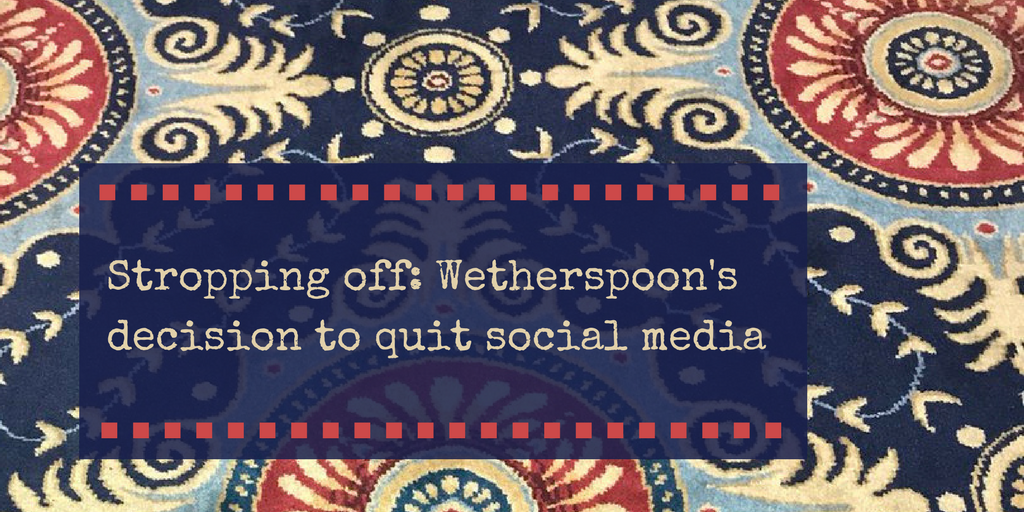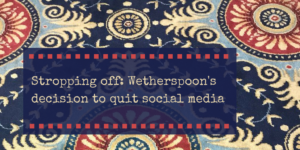I’ve decided to call any company’s snap decision to quit social media as “stropping off”, a term that simultaneously combines the banal act of logging off from social media with being loud about your reasons for doing it in an entirely tiresome way. Wetherspoon’s Tim has decided it’s their prerogative to be the first in what he sees as a tidal wave of businesses quitting Facebook and Twitter for good; a great example to put my new phrase into context.
He’s decided once and for all that his company doesn’t need social media to succeed, a decision that no doubt suits since I’d wager it was highly unpopular with him to begin with. Like many large businesses, social media at Wetherspoon’s was at best a direct complaints network, used by customers to air grievances about 75p surcharges for poached eggs and to ask where missing items from redesigned menus had disappeared to. Their Twitter account never really became the hub of pro-Wethers activity the company had no doubt hoped it would be, and with managers of each individual pub being given the task of running individual accounts too on top of their regular floor and bar duties, there was no real sense of cohesion. Without proper company-wide training and a level of respect and time given to digital marketing, this was a project doomed to fail.
That’s the thing about social media marketing though. If you only use it because everyone else is, you shouldn’t be on it. Get far away from it. Go outside. Paint a noticeboard and hand out flyers, they’ll proabably be far more useful to you. If you see social media marketing as a hindrance and an exercise in time wasting, as Wetherspoon’s Tim has said in a recent statement, you’re not doing it right. Get somebody in who understands how to use it effectively and who can give you statistical proof of its effectiveness each month. Train your staff to be able to do this and give them the time to do the job properly, or get rid of your platforms. After years of one star Facebook reviews getting ketchup all over his page, he’s chosen the latter.
As a former Wetherspoon’s employee and a freelance content marketer, I feel like I can say with some confidence that I know where this went wrong. It was the moment that Tim thought Facebook was a totally free marketing tool where visitors to his pubs could frolic freely amongst themselves, liking photos of Steak Night plates with genuine enthusiasm, sharing anecdotes from their most recent #spoonssesh until they went viral. It could have been glorious. Oh what a cruel mistress the reality of online marketing truly is.
Everything comes at a price. Twitter might be free to use, but the daily cost of seeing highly visible negative #content pile up like dirty all-day breakfast plates is too much for some companies, especially if they’re not well versed in social media crisis management. In an age when everyone has a camera and access to the entire world in their pocket, you’re going to need to be around to see what they say and to counter any bad feeling with an appropriate response. By getting rid of his accounts, Tim has effectively cancelled Wetherspoons online, and opened up the door to a thousand unfunny hoax accounts, the lowest form of Twitter wit.
It takes time and effort to run a successful business social media account, and rather than being an idle pursuit for the terminally bored and lazy, it’s becoming ever more complicated. Customers want to engage, but in very specific ways often known only to them and working it out takes longer than typing out “Happy hump day!” and hitting send. Sadly I presume most of the team leaders tasked with creating online ‘Spoons microclimates were given roughly four seconds per shift to do so. In fact, this quote from his official statement says it all:
“We were… concerned that pub managers were being side-tracked from the real job of serving customers” – Tim Martin, from an official statement, 15.04.18
If your boss feels part of your job isn’t “real work”, of course it’s going to take a lower priority than wiping the bar down every 30 seconds. After all, if you’re leaning, you should be cleaning; not interacting directly with your customers.
Essentially, I feel like this decision has been made bullishly and with little regard for how much being able to update the work Instagram account made people’s jobs a little bit more enjoyable. By claiming Wetherspoon’s withdrawal from social media is due to a backlash against the unhealthy nature of social media is quite hilarious. How many people have complained that they wished they could delete their Facebook app but simply couldn’t afford to miss the latest news from their favourite chain-owned local? At least we’ve still got Carpets of Spoons to keep us company.
We always thought each @jdwtweet had its own signature carpet, yet Ryde’s Fowlers has THREE juxtaposed like this! What’s the meaning of this @carpetsofspoons @SpoonsCarpets? pic.twitter.com/tWDT36BLuZ— Matt and Cat (@MattandCat) April 13, 2018
Quotes pulled from Tim’s statement and how I chose to translate them:
“We are going against conventional wisdom that these platforms are a vital component of a successful business.”
“I don’t believe that closing these accounts will affect our business whatsoever.”
“…This is the overwhelming view of our pub managers”
“If people limited their social media to half an hour a day, they’d be mentally and physically better off.”
“It’s becoming increasingly obvious that people spend too much time on Twitter, Instagram and Facebook, and struggle to control the compulsion.”
If you enjoyed reading this bit of pseudo-analysis fun, why not take a quick look at my Ko-Fi page, where you can support me as a writer by giving me a tip? Think of it like busking, only I’m not playing the bagpipes and you’ve chosen to come here and read my post all the way to the bottom. Thanks!



Would definitely make an interesting marketing research project though, how influential is social media in a person's choice of drinking location.
Given the demographic of the average Spoons drinker that I see whenever I get home to the UK, I'd be surprised if more than 10% of them have a Twitter account, not more than 40% have a Facebook account, and even then they gave up on it after a few months.
Social media is a great way of communicating with a company's target audience, but only if that target is actually there in the first place.
In my own experience, I am more likely to be put off a pub by their social media than be encouraged to visit, but that's probably me being a miserable old Gen X sod.
It definitely would make for interesting reading and you're right, a lot of companies should really look at their target audience's chosen platforms before attempting to run accounts on everything. I'd say that a lot of Wetherspoons customers are facebook users – their advertising could have been very effective done in a way that would interest their customers. As it is, they made enough money without having to try so *I guess* that means they don't need social media. But… imagine if they had tried. We're talking about a hypothetical number here, but there's every chance a series of effective social media campaigns would have made them even more money. But that's just speculation based on being a digital marketing bore.
The problem with customers is that they usually bring problems. In the main the Spoons Facebook contributors were people who prefer to avoid face to face contact. Well now they don't have a choice. If it's bad enough they'll have to bring it up at the time, and if it's not then STFU.